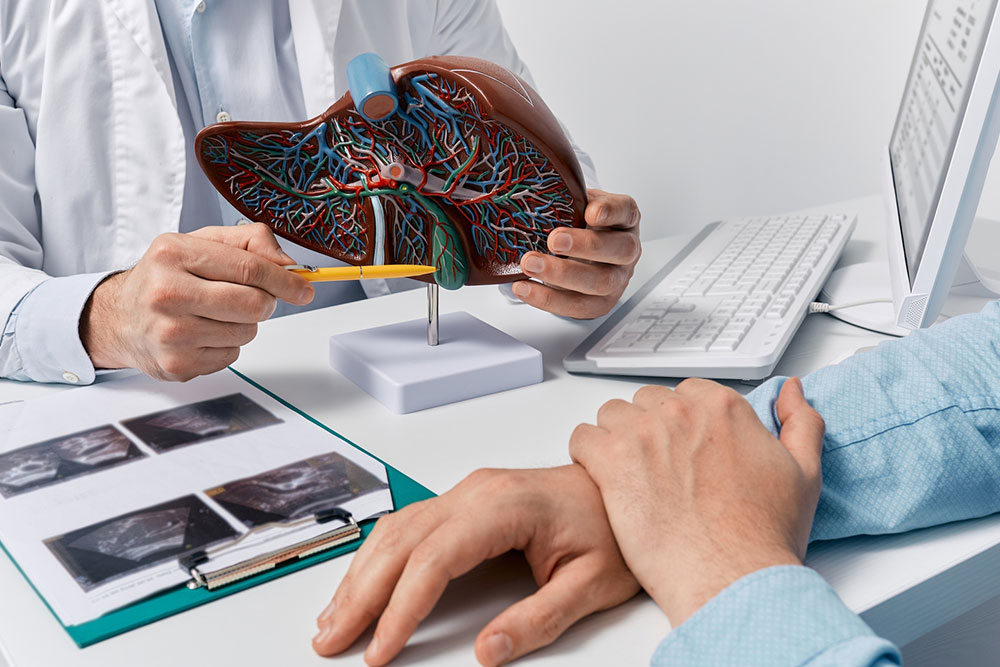
Liver cancer – Symptoms, causes, and management
The liver is the largest internal organ, serving many important functions such as breaking down and storing nutrients, metabolizing certain nutrients, producing clotting factors, delivering bile to the intestines, and breaking down toxic waste in the body. In some cases, cells in the liver can form cancerous or non-cancerous tumors, which can lead to primary liver cancer. Read this article to understand this condition, including its symptoms, causes, treatments, and remedies.
Types of liver cancer
There are three primary types of liver cancer:
- Hepatocellular carcinoma: This is the most frequently occurring type of liver cancer.
- Intrahepatic cancer (IHC): When cancer begins in the bile duct in the liver, it is known as IHC. These cases make up 10–20% of all cases of primary liver cancer.
- Angiosarcoma: Angiosarcoma begins in the lining of the blood cells in the liver. It is the rarest form of primary liver cancer.
What are the symptoms of liver cancer?
In the early stages of liver cancer, one may not show any signs or symptoms. However, as the condition progresses, one may experience the following symptoms:
- Discomfort in the upper abdomen region
- Swelling in the abdominal region
- A hard lump on the right side, just below the rib cage
- Jaundice
- Pain near the right shoulder blade or in the back
- Easy bruising or bleeding
- Unusual tiredness or weakness
- Loss of appetite
- Pale, chalky bowel movements
- Dark urine
- Fever
What causes liver cancer?
Liver cancer occurs due to mutations in healthy cells in the liver. In some cases, it could be a result of chronic hepatitis infections. However, it may also affect people with no underlying conditions.
While the exact cause of liver cancer may not always be known, the following factors may increase one’s risk of developing this condition:
Chronic infection with HBV or HCV
A person with chronic Hepatitis B or C infections may have a higher chance of developing liver cancer.
Cirrhosis
Cirrhosis is a progressive disease that causes scarring of the liver tissue. It could put one at greater risk of liver cancer.
Inherited liver disease
Those with inherited liver diseases such as hemochromatosis and Wilson’s disease have an increased likelihood of developing liver cancer.
Diabetes
Those with diabetes and high blood sugar are at higher risk of developing liver cancer.
NAFLD
This condition causes fat buildup in the liver, restricting liver function. Those with NAFLD have an increased chance of developing cancer as well.
Exposure to aflatoxins
Poor storage of crops can lead to mold growth. This gives rise to aflatoxins, which are poisonous. Exposure to these toxins can lead to a heightened risk of liver cancer.
How is liver cancer diagnosed?
To diagnose liver cancer, doctors often use a combination of blood tests, imaging tests, lab tests, and a liver biopsy. Once the condition is diagnosed, doctors identify the stage of liver cancer. These tests are meant to determine the size, location, and spread of cancerous cells.
How is liver cancer treated?
Taking these results, one’s age, and health preferences into account, doctors may prescribe one or more of the following lines of treatment:
Surgery
In certain cases, surgery may be necessary to remove the tumor. For those with healthy lung function, this may be a partial surgery to remove the cancer cells and a small portion of healthy tissue surrounding them. In more severe cases, liver transplant surgery may be required.
Radiofrequency ablation
This technique uses electric current to heat and destroy cancer cells.
Cryoablation
During this procedure, extreme cold is used to destroy cancer cells. It makes use of a cryoprobe containing liquid nitrogen that is placed directly on the tumor.
Chemotherapy
Chemotherapy is the use of certain prescriptions to kill fast-growing cancer cells. When targeted to the liver, it is also known as chemoembolization.
Radiation therapy
This treatment uses high-powered energy from X-rays and protons to destroy cancer cells. It may be prescribed as an option if other forms of treatment are not possible or have not helped.
Targeted therapy
Targeted therapy focuses on the abnormalities in cancer cells. They block these abnormalities, causing cancer cells to die. It is often used as a treatment option for advanced liver cancer.
Immunotherapy
This form of treatment interferes with the immune response to cancer cells. It uses the body’s immune strength to fight against cancer cells. It is most commonly used by people with advanced liver cancer.
Palliative care
Palliative care is used in conjunction with all the above forms of treatment. It is aimed at alleviating pain and reducing the symptoms of cancer.
Alternative remedies for liver cancer
To cope with pain during liver cancer treatment, one can also turn to alternative remedies such as acupressure, acupuncture, hypnosis, massage, or relaxation techniques. Speak to a healthcare professional regarding precautionary advice and tips for practicing these safely.




